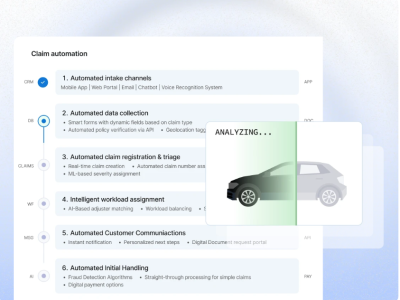Top LMS platforms to upgrade employee learning and development journey
In 2026, we will see organizations increasingly investing in Learning Management Systems (LMS) to keep pace with skill development and digital learning.
From onboarding new employees to upskilling existing teams, a good LMS helps companies streamline learning, track progress, and boost employee performance.
With so many Learning Management System (LMS) platforms out there today, how do you select the one best suited for you?
Don’t worry; we have done the research for you.
Here are 10 best Learning Management System (LMS) examples to keep in mind for 2026, whether you’re running a large enterprise or fast-growing startups alike. There’s something here for every kind of learner.

What is a Learning Management System (LMS)?
A Learning Management System (LMS) is a type of software or cloud tool that helps companies create, manage, and deliver training or learning programs online.
LMS is designed to fit your organization’s training needs, whether you’re trying to boost employee skills, improve engagement, or make sure everyone is properly trained.
An LMS makes it easier for HR or Learning & Development (L&D) teams to create training courses, share them with learners and monitor their progress all in one central place.
When you choose the right LMS, it can help your business save time, improve onboarding, and show clear results like better performance and return on investment (ROI).
Why Should You Use an LMS Platform?
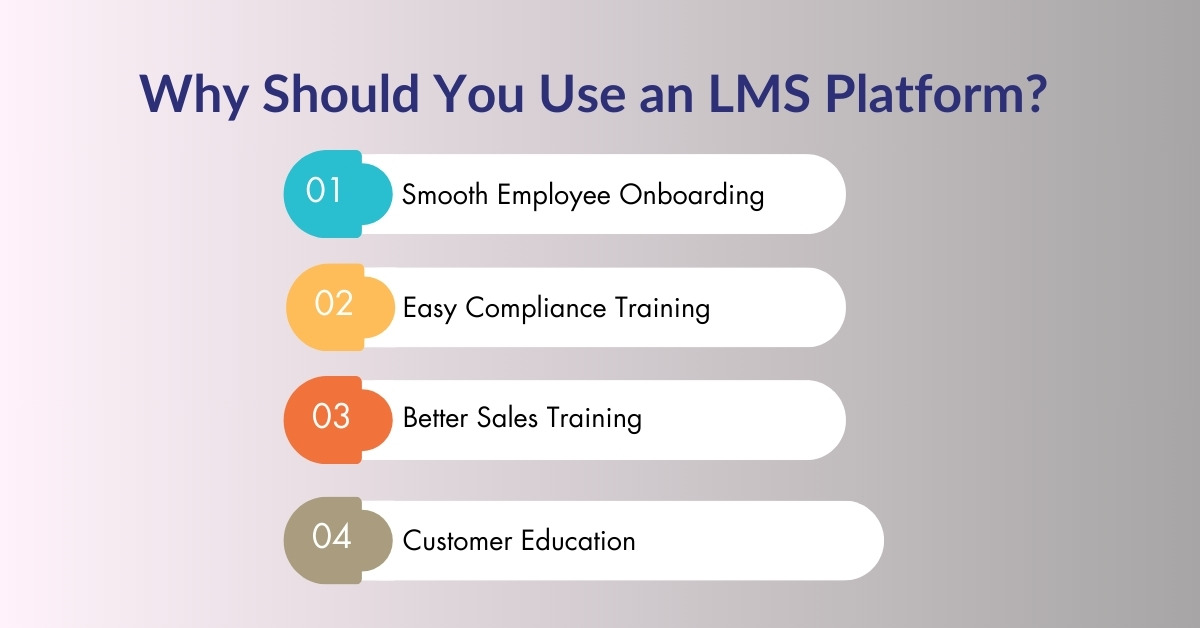
An LMS (Learning Management System) is useful for many reasons.
While every company may use it a little differently depending on their industry or location, there are some common ways businesses get real value from an LMS.
Let’s look at a few:
1. Smooth Employee Onboarding
An LMS makes it easy to onboard new hires. You can create training based on their role and let them learn through self-paced videos or interactive sessions. This saves time and helps them feel confident quickly.
2. Easy Compliance Training
With an LMS, you can quickly build and update training for safety, data protection, or other rules your team must follow.
You can even involve your in-house experts to help create courses, making training more relevant and engaging.
3. Better Sales Training (Sales Enablement)
You can use an LMS to train your sales team faster, improve their skills, and help them close more deals. It lets them learn while they work, making them more productive and confident.
4. Customer Education
Instead of repeating the same training over and over, you can use an LMS to offer helpful guides, courses, or videos to your customers.
This helps them understand your product better and get more value from it.
10 Best Learning Management System Examples
1. Cornerstone OnDemand

Best for: Enterprise learning, compliance, and performance management
Cornerstone is a leader in the LMS space and continues to dominate in 2026. It’s designed for large companies that want more than just e-learning.
Cornerstone OnDemand integrates performance management, learning analytics, and employee development.
Key Features:
-
- AI-powered content recommendations
-
- Compliance training and certification tracking
-
- Seamless integration with HR tools
-
- Personalized learning paths
-
- Supports mobile learning
Why we love it:
Cornerstone uses machine learning to suggest the right content to the right people, making learning both personalized and strategic.
2. Saba Cloud (now part of Cornerstone)

Best for: Learning experience and talent development
Saba has long been trusted for its innovative and engaging learning experiences. Now part of the Cornerstone family, it still shines with powerful features that support skills development, career planning, and performance reviews.
Key Features:
-
- Social and collaborative learning
-
- Goal setting and performance alignment
-
- Mobile-friendly design
-
- Smart content recommendations
-
- Real-time analytics and reporting
Why we love it:
Saba combines traditional LMS functions with a deep focus on people-first learning — helping learners stay engaged and grow faster.
3. TalentLMS
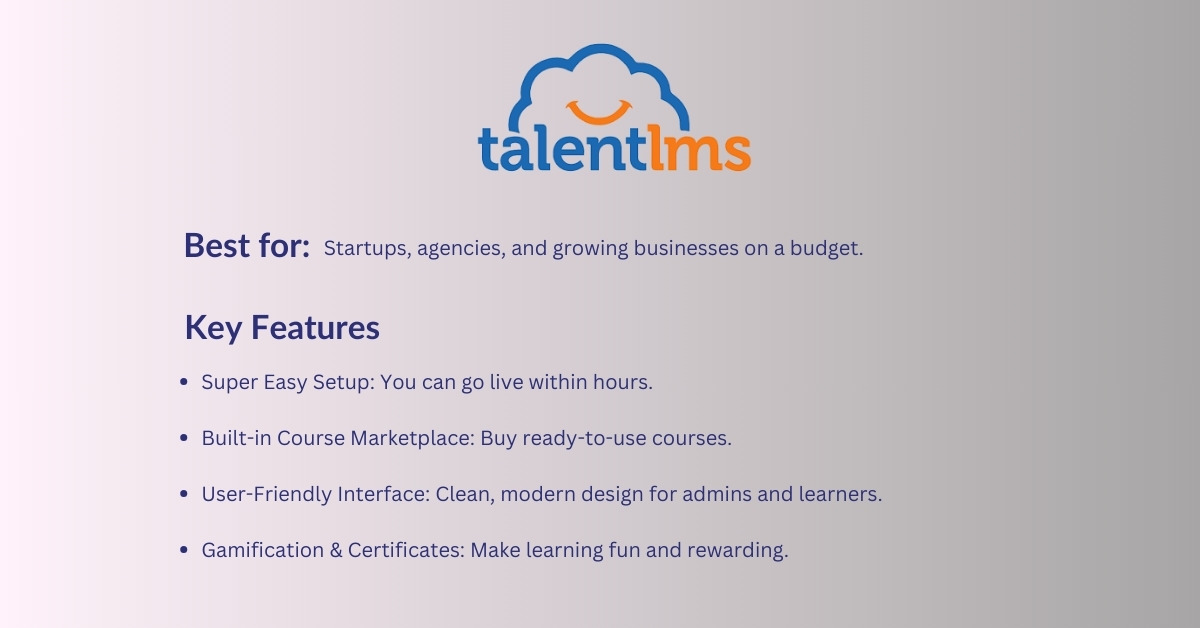
Best for: Small to mid-sized businesses and remote teams
TalentLMS is a lightweight, yet powerful LMS that helps businesses launch training programs in minutes. It’s cloud-based, easy to use, and doesn’t require any technical skills.
Key Features:
-
- Drag-and-drop course builder
-
- SCORM and xAPI support
-
- Custom branding options
-
- Gamification and quizzes
-
- Affordable pricing
Why we love it:
It’s ideal for startups and growing businesses looking for a cost-effective, intuitive LMS with fast setup.
4. Docebo
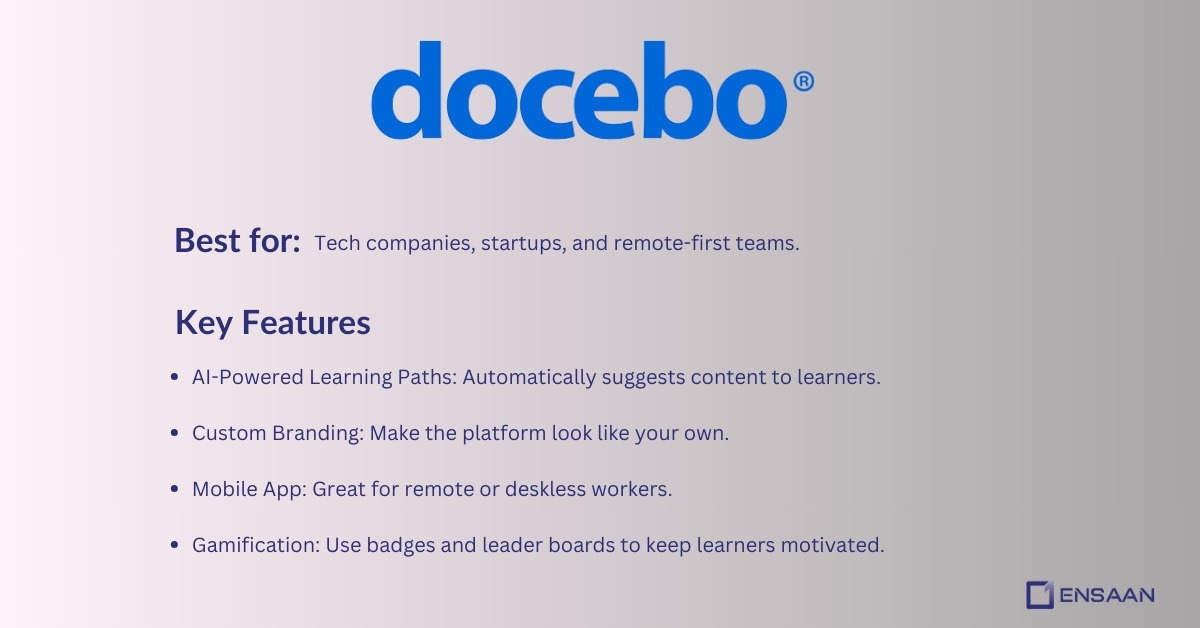
Best for: AI-powered learning automation and personalization
Docebo is famous for its AI capabilities, allowing organizations to automate content delivery and learning journeys. It’s a modern LMS with a focus on engagement and scalability.
Key Features:
-
- AI-powered learning paths
-
- Content marketplace integrations
-
- Social learning features
-
- Strong analytics dashboard
-
- Mobile and cloud-native
Why we love it:
Docebo makes learning feel natural and personalized especially useful in large, distributed teams.
5. SAP Litmos
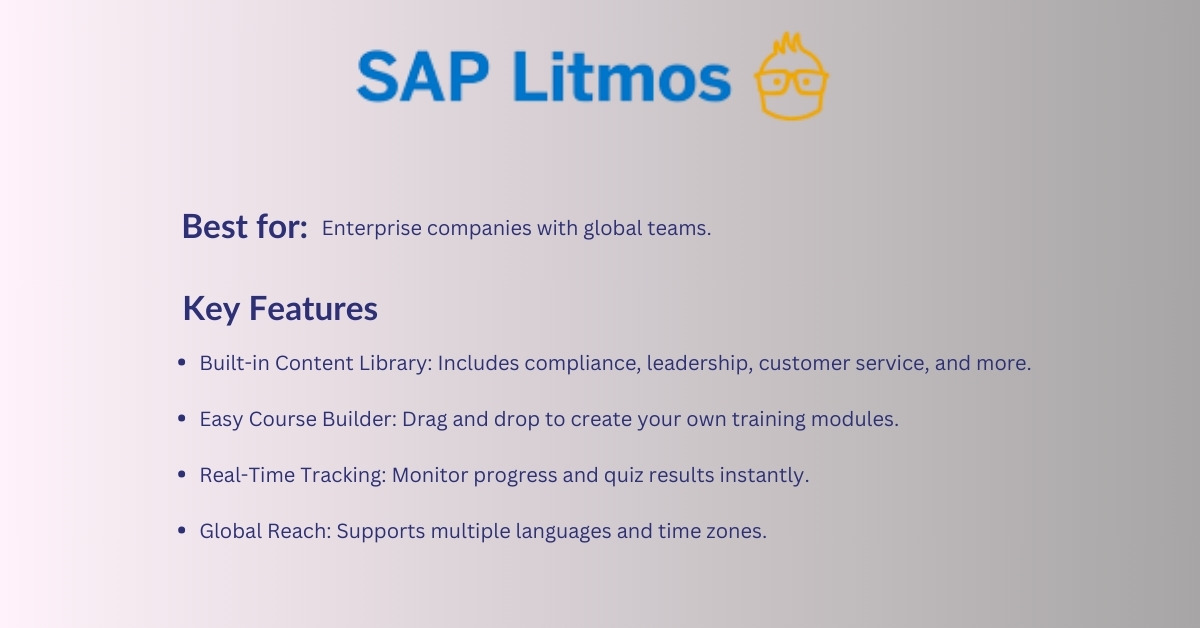
Best for: Corporate training and compliance
SAP Litmos is built for fast and easy training delivery. Whether you’re onboarding new hires or delivering compliance training, this LMS simplifies the learning process.
Key Features:
-
- Pre-built courses library
-
- SCORM and AICC compliance
-
- Mobile app for anytime learning
-
- Custom branding and certificates
-
- Built-in eCommerce options
Why we love it:
Litmos offers pre-made training modules, saving businesses time and effort in content creation.
6. Xpertlearning LMS
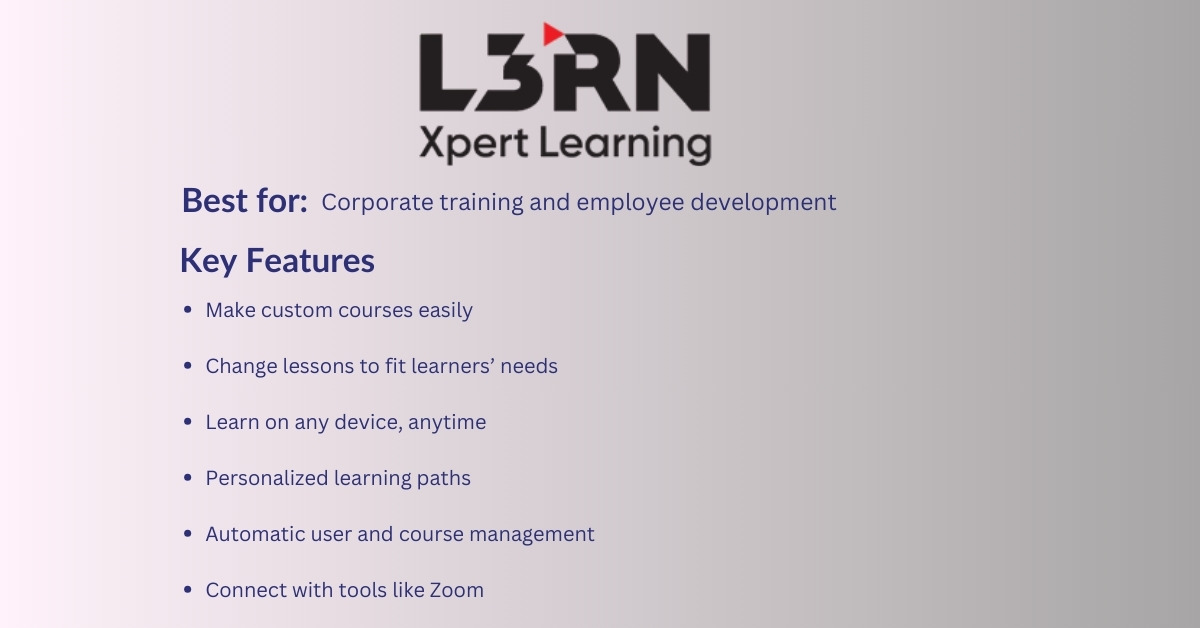
Best For: Corporate training and employee development
XpertLearning LMS is an easy-to-use online learning platform that helps corporate companies and governments deliver training and track progress. It offers customizable courses, tests, and performance tools, backed by a team with strong experience in digital learning especially in the Middle East and globally.
Key Features:
-
- Make custom courses easily
-
- Change lessons to fit learners’ needs
-
- Support for teachers and trainers
-
- Learn on any device, anytime
-
- Personalized learning paths
-
- Automatic user and course management
-
- Connect with tools like Zoom
-
- Track learner progress with reports
-
- Mix online and social learning
Why we love it:
Xpertlearning LMS is Simple and flexible to use, with excellent customer service and multi-audience support.
7. LearnUpon
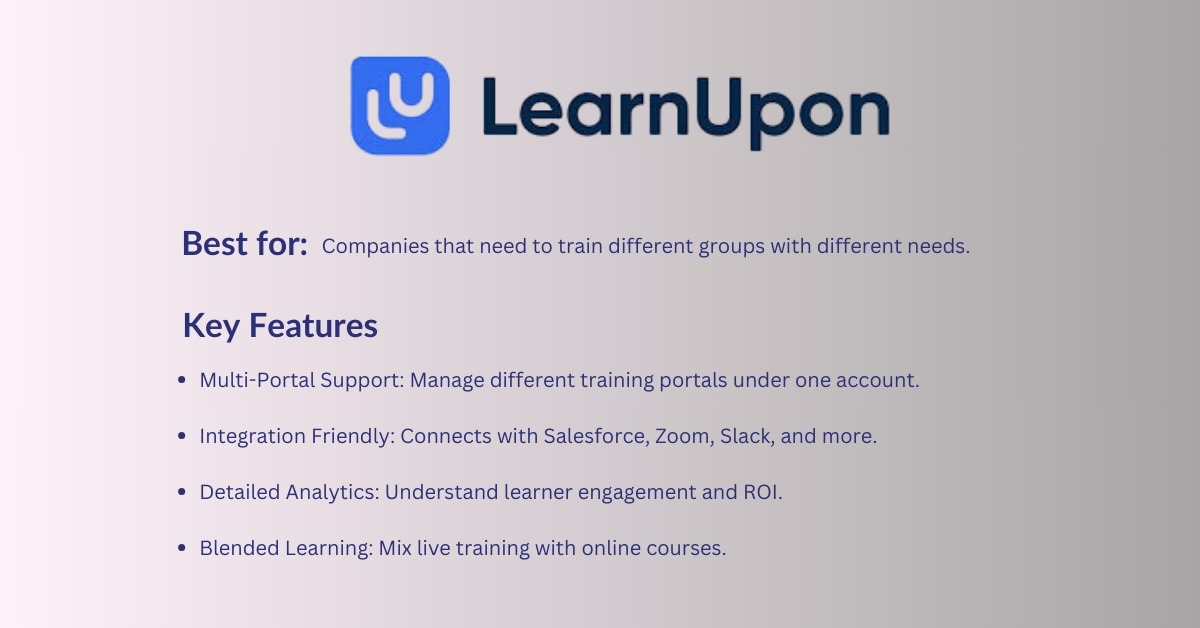
Best for: Blended learning and customer training
LearnUpon is designed for businesses that train employees, customers, and partners. It supports blended learning, mixing live training and e-learning.
Key Features:
-
- Multi-portal setup
-
- Certifications and compliance tools
-
- Webinar integration
-
- Custom learning paths
-
- Powerful admin dashboard
Why we love it:
LearnUpon is flexible and scalable, with excellent customer service and multi-audience support.
8. iSpring Learn
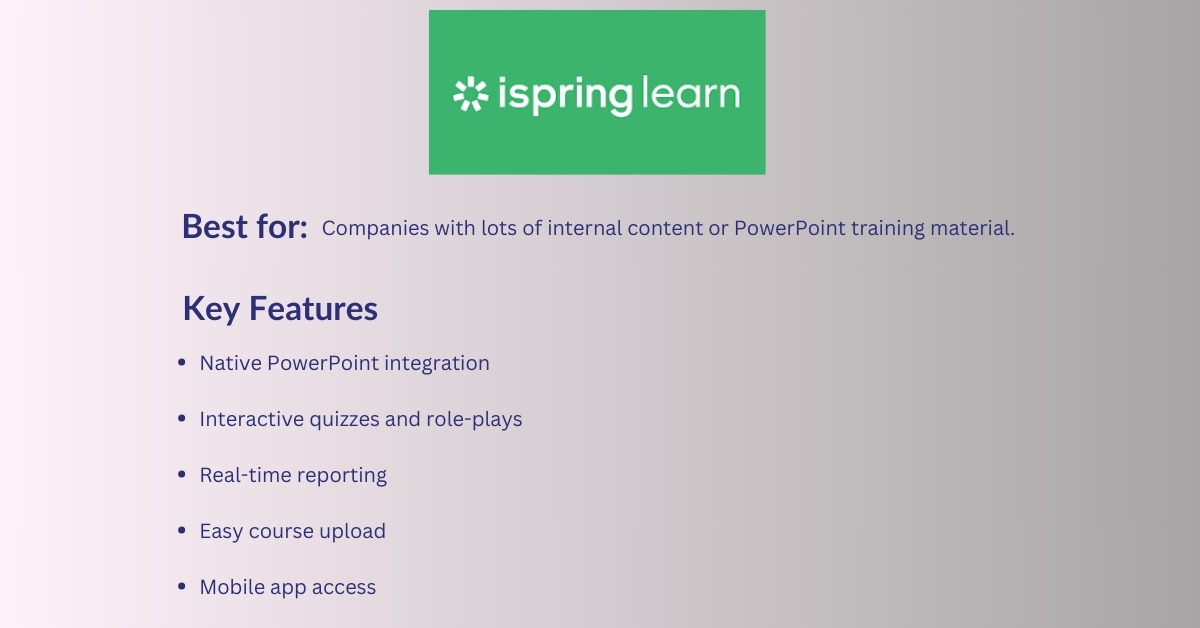
Best for: Fast course deployment and PowerPoint-based content
iSpring Learn is a fast LMS with a strong focus on ease of use and rapid course creation. If you already use PowerPoint for training, this LMS will fit right in.
Key Features:
-
- Native PowerPoint integration
-
- Interactive quizzes and role-plays
-
- Real-time reporting
-
- Easy course upload
-
- Mobile app access
Why we love it:
Its simplicity and speed make it great for companies who need quick training rollouts.
9. Absorb LMS
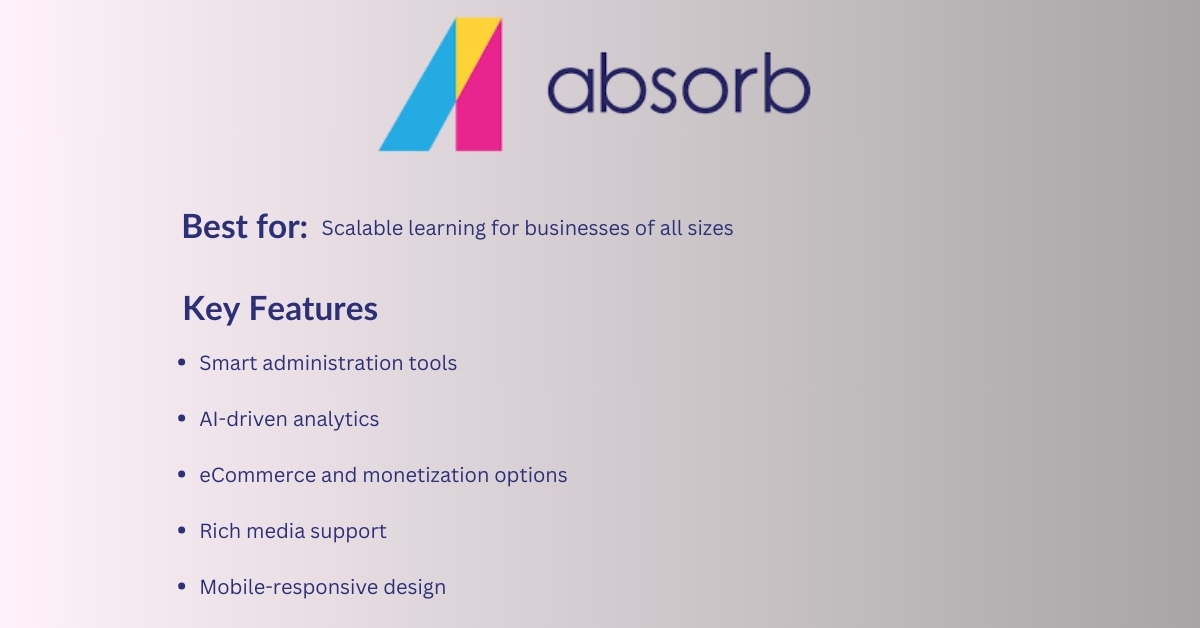
Best for: Scalable learning for businesses of all sizes
Absorb LMS is all about clean design, automation, and flexibility. It’s designed for businesses that want to deliver engaging learning content at scale.
Key Features:
-
- Smart administration tools
-
- AI-driven analytics
-
- eCommerce and monetization options
-
- Rich media support
-
- Mobile-responsive design
Why we love it:
Absorb’s clean interface and advanced features make it one of the most user-friendly LMS platforms around.
10. 360Learning
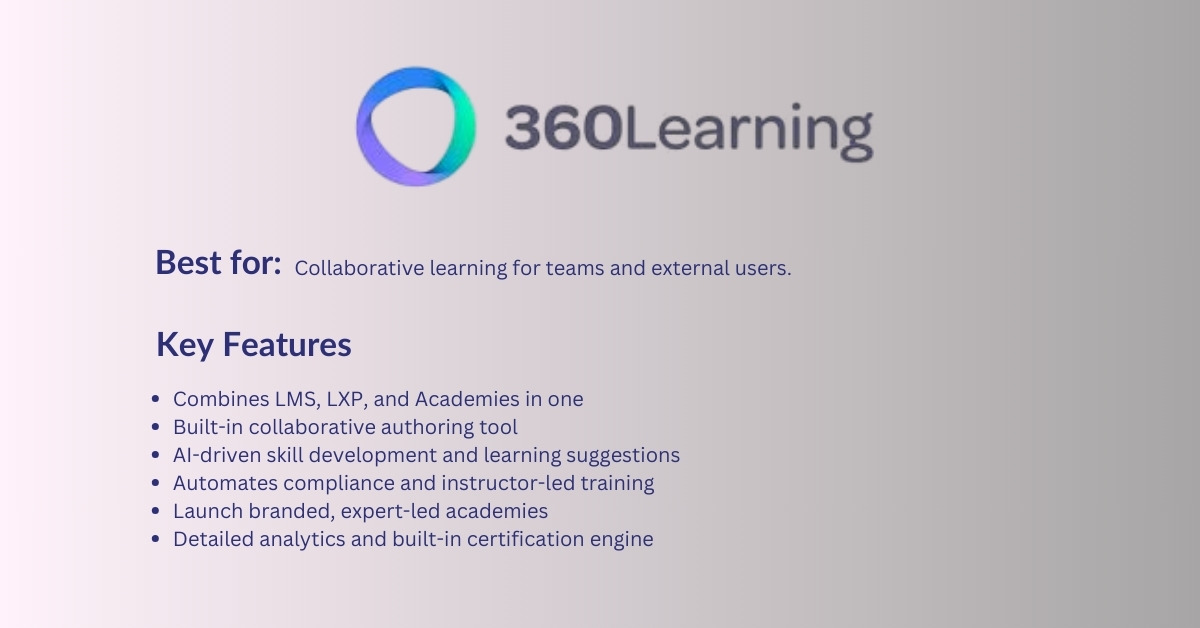
Best for: Collaborative learning for teams and external users.
360Learning is a smart learning platform that mixes LMS, LXP, and training academies into one tool. It’s perfect for companies that need to train both their employees and external people like customers or partners.
Key Features:
-
- Combines LMS, LXP, and Academies in one
-
- Built-in collaborative authoring tool
-
- AI-driven skill development and learning suggestions
-
- Automates compliance and instructor-led training
-
- Launch branded, expert-led academies
-
- Detailed analytics and built-in certification engine
Why we love it:
360Learning makes learning collaborative and expert-driven, helping teams upskill faster all within a user-friendly interface.

Conclusion
Choosing the right Learning Management System (LMS) can help your business train employees faster, track their learning, and improve performance.
Whether you’re a mid-size company or a big one, there’s an LMS on this list that can match your needs.
From onboarding and compliance to customer education and sales training, an LMS makes learning easier and more effective.
In 2026, these 10 LMS platforms are leading the way in helping teams learn and grow. So, take your time, explore these options, and pick the one that works best for your team.
FAQs
1. What is an LMS used for?
An LMS is used to create, manage, and deliver educational or training content to employees or students.
2. Can I track learner progress in an LMS?
Yes. Most LMS platforms offer real-time analytics, completion tracking, and performance reports.
3. Is mobile learning supported in LMS tools?
Yes, top LMS platforms like Cornerstone, Docebo, and iSpring Learn offer mobile-friendly learning experiences.
4. How much does an LMS cost?
Costs vary. Some are free, like Moodle, while others have subscription-based pricing starting from $2 to $15 per user/month depending on features.


